|
| OO Scale | N Scale | G Scale | Z Scale | HO Scale | Slot Cars & R⁄C |
| |||||||
|
|||||||
| Home Page | |||||||
| BUY GIFT VOUCHERS | |||||||
| Products | |||||||
| Latest News | |||||||
| RIGHT LINES | |||||||
| Bargains | |||||||
| Downloads | |||||||
| Events | |||||||
| Careers & Jobs | |||||||
| Carriage Services | |||||||
| About Us | |||||||
| Contact Us | |||||||
| Pay Us A Visit | |||||||
| Meet The Staff | |||||||
| Links | |||||||
| SHOPPING BASKET |
Your shopping basket is empty. To add an item, click the "Buy" button
| YOUR ACCOUNT | ||
|
||||
 |
||||
| Prodigy Advance Digital System |
||||
| Cased Controllers |
||||
| Panel Mount Controllers |
||||
| Walkabout Controllers |
||||
| Modules & Transformers |
||||
| Scenics & Accessories |
||||
| Wiring & Electrical Components |
||||
| Tiny Signs | ||||
| Tools | ||||
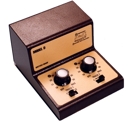 |
||||
| O Scale | Wargaming | Architectural | Narrow Gauge | Tools+ | ||
Seaton Tramway

MATT LOVELL tells us about his recent visit to this narrow gauge tramway in Devon.
Seaton in Devon was originally served by a branch line, which opened in 1886. This came off the Salisbury to Exeter mainline, and helped grow Seaton and nearby Beer into top holiday destinations. However, by the 1960s increased car ownership meant that less people were using the train for holidays, and the line closed in 1966 as part of the Beeching Axe.
Between 1969 and 1971 part of the line was converted into a 2ft 9inch narrow gauge electric tramway by Claude Lane, who was already running a similar line in Eastbourne. The line opened in 1970, with a limited service from Seaton, but was extended to Colyford in 1971, and then to Colyton in 1980, completing the current three mile route.
During my recent holiday to one of my favourite places in the UK, I thought it would be rude not to visit one of Devonís top attractions. It's a place that I have been many times before.
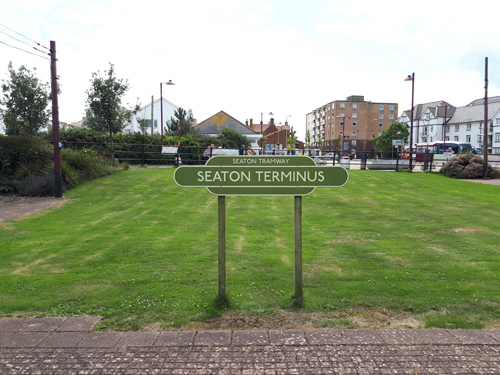
We started our visit by heading to the tram station at Seaton, and were greeted by the tram.
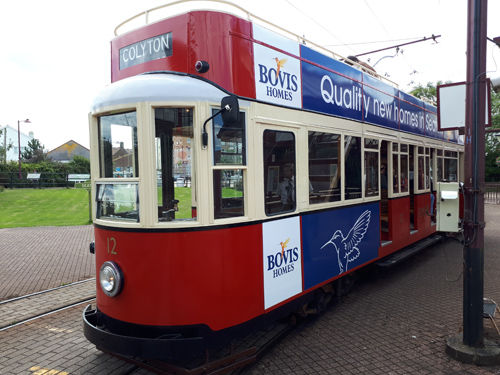
As we had some time before the oncoming tram was due in I took this time to take some photos and some video footage for my collection.
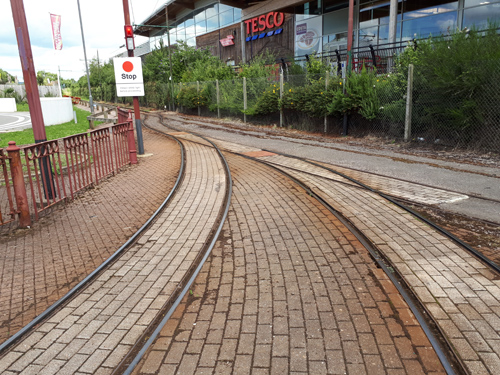
One of the photos I took was of the Railbed (above). I find things like this interesting as you donít always see things like this in West Sussex where I live. The rails are laid down and then a layer of bricks are laid around it, which brings the top of the rail to road height for road vehicle access. This was also a common practice in many dockside railways back in the day.
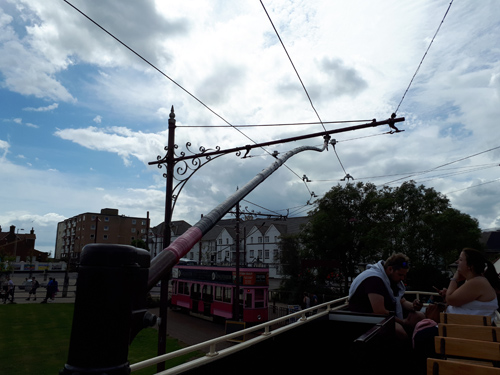
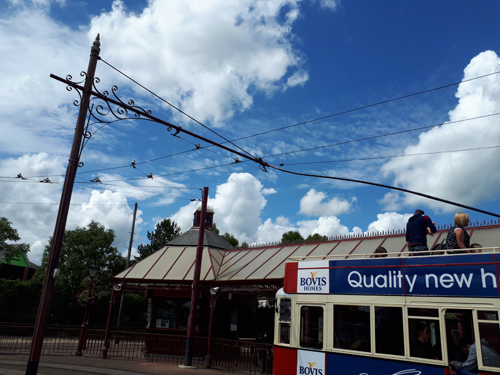
Another picture I took was of the electrical arm attached to the top of the Tram, which provides the electricity required to run the motor. The arm is normally positioned towards the back of the tram to allow for a smooth glide along the pickup wire above.
After a few other snaps I heard a rumbling from down the line so I went and stood near the points to watch the oncoming tram pulling into the station. Once the passengers had alighted from the tram the electrical arm was pulled off the pickup, rotated 180 degrees, and then reattached to the pickup wire.
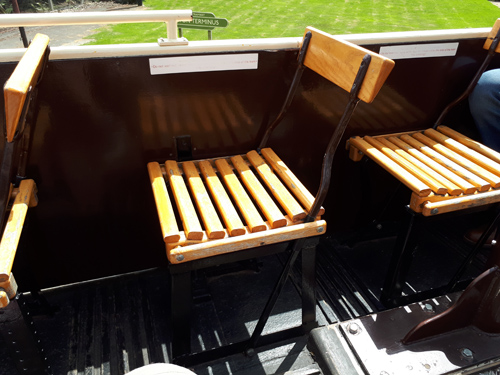
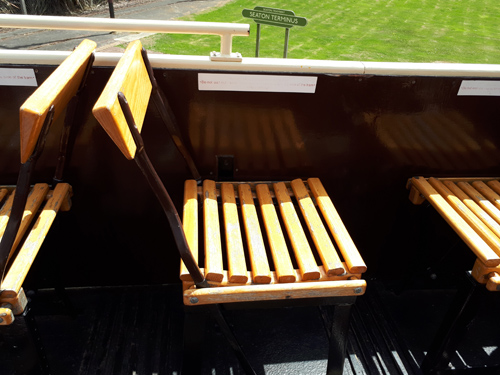
It was then time to get back on the tram so up to the top deck I went to get ready for the journey ahead. The seats used on the tram are designed so they can be positioned for forward and reverse travel. The guard would simply walk along the middle isle and flip the back of the seats to suit direction of travel.

It did get a bit windy up on the top but it is still a trip I would highly recommend.
While we were trundling down the line we passed all sorts of sights including the tram depot, the river and lots of areas for bird watching.
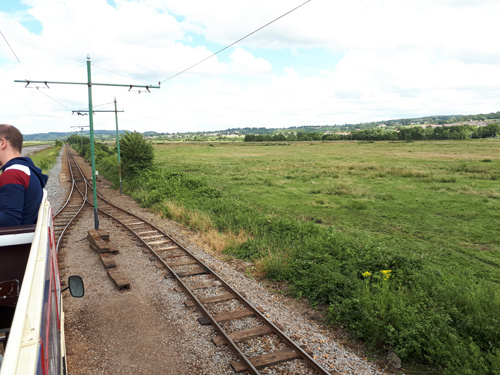
There are a few passing positions where the trams can pass by each other safely. The points are latched so they can only pass one way round.
After about ten minutes we reached the level crossing at Colyford Station. Here the driver had to get out of the tram to set the crossing, wait for the barriers to drop down and traffic to stop. Once the tram had crossed the crossing the driver got out of the tram again to reset the crossing back to normal. The staff even has a bit of a running joke when crossing as they invite the passengers (mostly the children) to pull funny faces at the stationary cars.
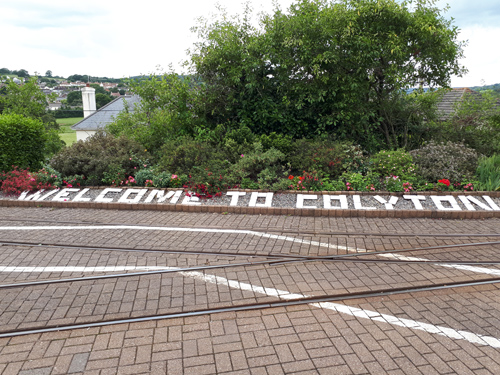
After another ten minutes or so we reached the end of the line at Colyton Station, where we had to alight from the tram. Being a bit of an enthusiast I had to see how the tram overhead pickup turned around as I was told they do it automatically.
This was very cool to watch, as it did not involve any driver/guard interaction apart from driving the tram in reverse.
We then stopped for a bit of lunch at the cafe to wait for another tram to pull in to the station.
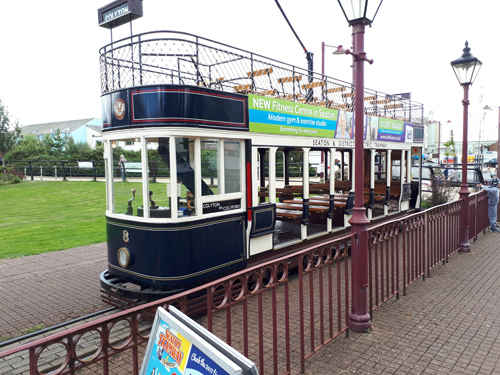
The journey took roughly two hours with stops for lunch, and was a very enjoyable ride, although a bit bumpy along the way! It's a trip I am looking forward to hopefully doing again in the future.
|
We are always looking to make improvements to our website to try and improve the quality of your visit. We would welcome your feedback and suggestions, so please do not hesitate to e-mail our webmaster with your comments. Alternatively call us on 01903 884488.
Home Cookies Privacy Statement Terms & Conditions Site Map Site Guide
WEEE Regulations Glossary Careers & Jobs
Tel – +44 (0) 1903 884488 Fax – +44 (0) 1903 884377 E-Mail us – click here
Gaugemaster.com is a trading name of Gaugemaster Controls Ltd.
Registered in England No. 2714470, Registered office:
Gaugemaster House, Ford Road
Arundel, West Sussex, BN18 0BN, United Kingdom
VAT Reg. No. 587 8089 71
Copyright © 2003-2014 Gaugemaster Controls Ltd. All Rights Reserved.
















